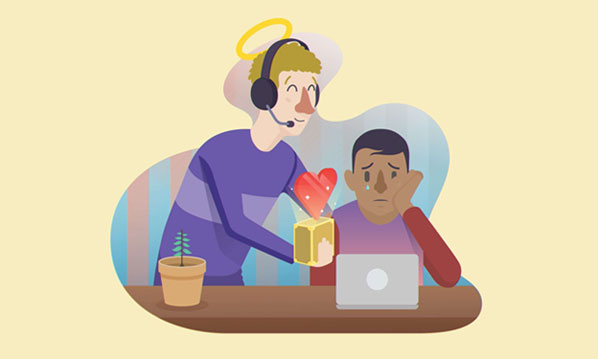
Customer Experience (CX) begins with empathy. To be successful, organizations around the world need to understand and care for their clients, as well as their experiences and demands.
Keep in mind that there are two types of empathy:
- Affective: This one is associated with the way we feel about other people’s emotions and feelings.
- Cognitive (aka ‘perspective taking’): This one refers to our ability to correctly interpret other people’s emotions.
Enhancing customer experience is more than just a professional skill. It’s not a one-time event either. Customers’ needs change over time. If companies do not take that into account, they risk losing their customers. It’s therefore critical that senior management come up with an innovative strategy that will allow them to retain their clients and keep on growing.
Skills in the CX Pro Box That Stem from Empathy
Empathy is related to a number of crucial business roles, so let’s analyze them one-by-one.
Innovative Solutions Specialist
An Innovative Solutions Specialist should be aware of which products and services will help their company achieve its goals. Such people should also be able to quickly come up with solutions to various issues. While a CX professional is responsible for ensuring improved customer experiences, that’s impossible without empathy, new ideas and innovative approaches.
Client Advocate
The role of Client Advocate is responsible for customer satisfaction and needs to make sure that the client is the company’s top priority. This requires them to represent and defend the client’s interests. Advocates are also responsible for making sure the customer’s story resonates well with key shareholders.
Relationship Builder
The Relationship Builder should listen to and interpret their customer’s needs. Communicating the needs of the client properly requires empathy.
Coach
The Customer Experience Coach is the company’s master unifier. They should raise the subject of empathy and train employees accordingly. They may even consider writing an informative essay on the topic to share with their colleagues. It’s important that all the company’s departments work to achieve the same set of goals and a coach that works across silos will provide the most value. Selfless empathy is the key to success in this case.
Change Catalyst
The Change Catalyst’s goal is to get the company to effect change for the sake of the client. Once the company gets feedback from its clients, it needs to make sure that their voices are heard and understood properly. Change Catalysts serve as both influencers and negotiators. This requires emotional intelligence, and in turn, empathy.
Data Scientist
The Data Scientist helps develop a cutting-edge customer experience. To achieve that, they should keep up with the latest trends and monitor changing customer demands in order to provide clients with a better experience.
How to Develop Empathy
Now that we’ve covered the importance of empathy and how it effects different business roles, let’s look at how empathy skills can be developed.
Cultivate curiosity
Listen carefully to customers and collect as much feedback as possible. Listening skills can be developed in fun ways such as exposure to movies, newspapers, social networks as well as in the workplace. Some companies even allow the keeping of office pets to create an empathetic environment and nourish creativity!
Put yourself in the shoes of other people
For instance, if your customers are in their 20s and you’re a little older, you need to find out about the lifestyle of younger people. Take part in discussions with various age groups to keep up with the latest trends. Different generations have different demands.
Take ownership
Take ownership of a client’s issue or complaint. Companies should build systems that will make it possible to respond to a customer’s problem and solve it as soon as possible. Any team member should be able to answer the customer’s questions or resolve issues without delegating it to other departments.
Tips for Cultivating Empathy
Cultivating empathy may not be easy but it is achievable. Remember these simple steps:
- Smile
- Listen carefully to other people
- Make it your customer’s problem your problem
- Remain respectful and patient
- See problems through the eyes of your client
- Set priorities
- Make positive statements
- Avoid assumptions
Practice developing your empathy skills and your customer’s experience will improve too!




